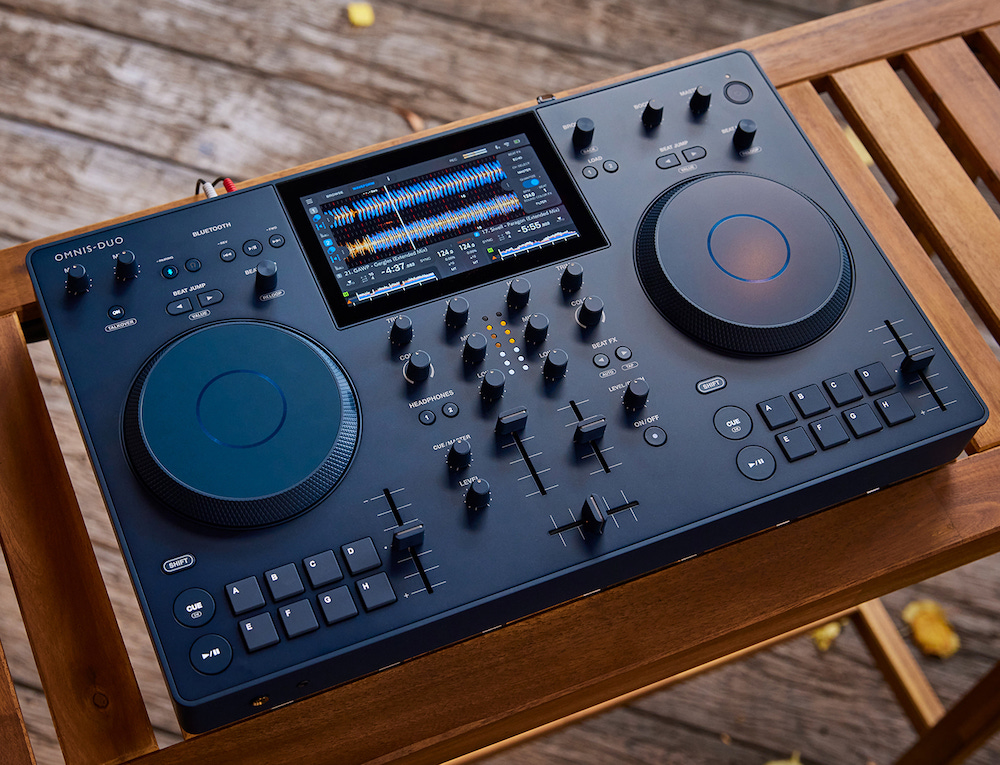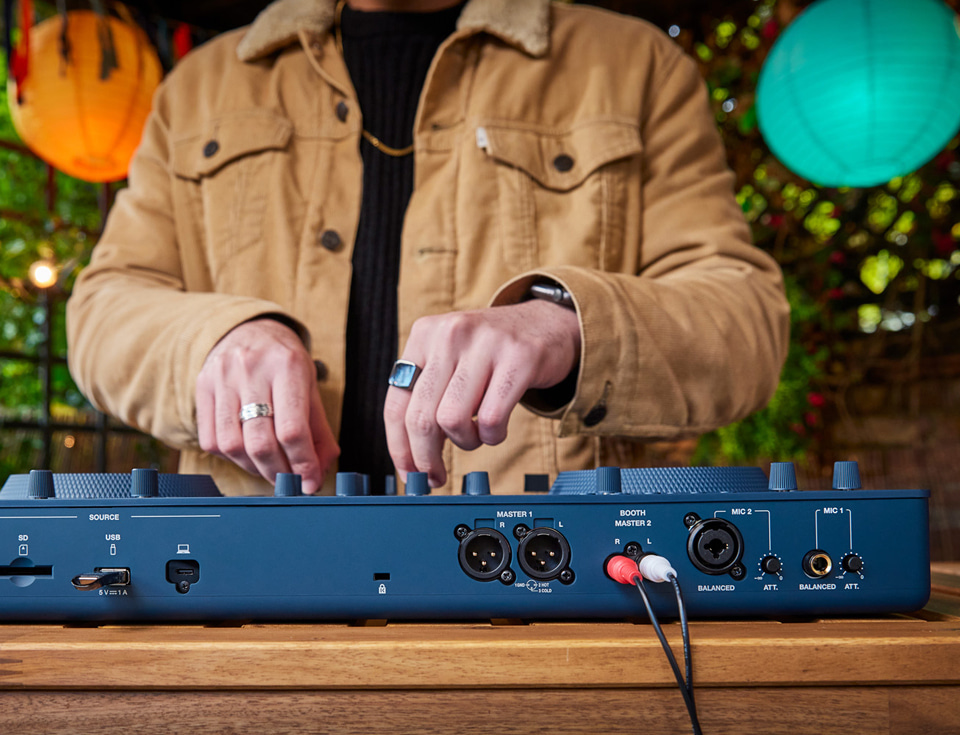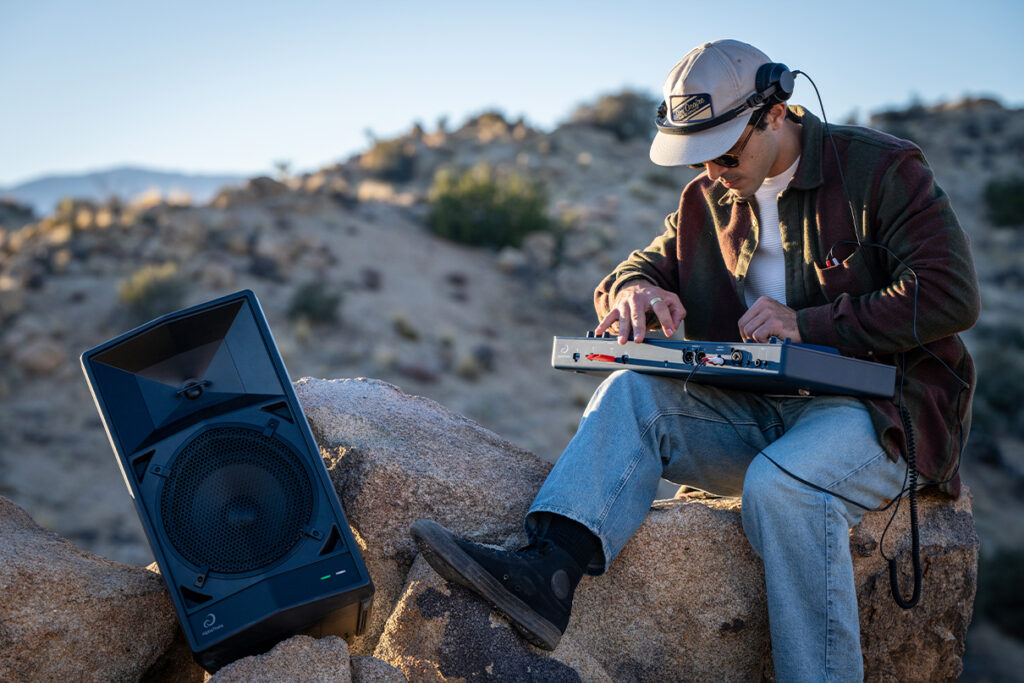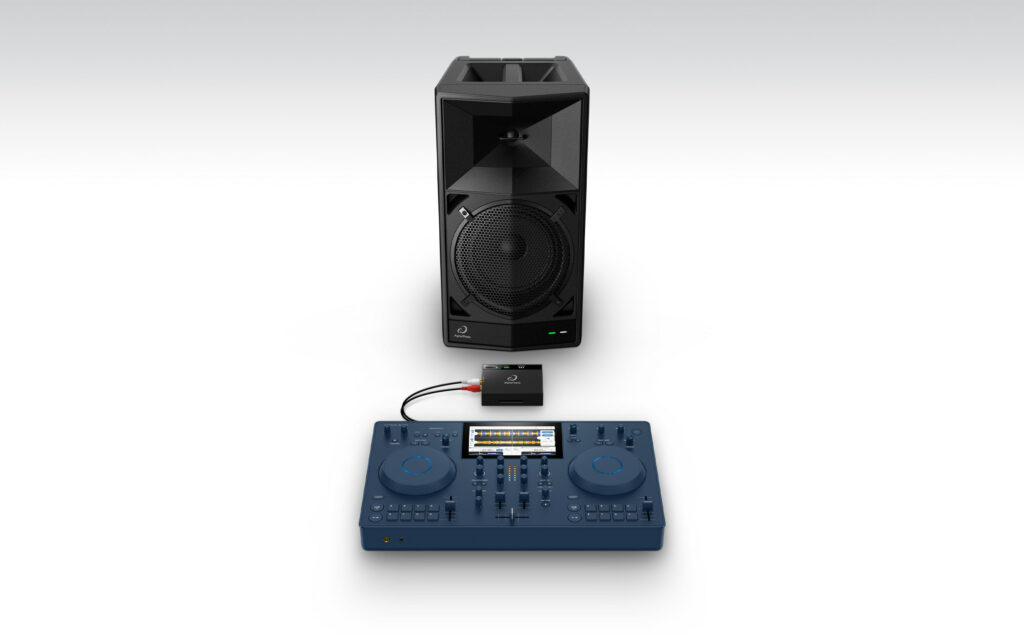A debut controller from Pioneer’s parent company, the Omnis Duo is a unique next-generation offering. Greg Scarth checks out the future.

The AlphaTheta Omnis Duo is the first release under the brand name of Pioneer DJ’s parent company. The brand explain that the AlphaTheta name will be used for more experimental products, and doesn’t necessarily herald the end of Pioneer DJ. It’s a two-channel, all-in-one standalone controller with built-in rechargeable battery. While it’s compatible with Pioneer’s Rekordbox ecosystem, it does things a bit differently to conventional Pioneer DJ products.
First impressions upon opening the Omnis Duo are that it’s strikingly attractive, with an indigo colour scheme and slightly rubberised feel. It’s undoubtedly a more ‘lifestyle’ inspired design approach than the ultra-techy approach favoured by most Pioneer DJ products, but that’s probably a reflection of its intended use. This is a stylish product designed to look good as well as work well. Curiously, the Omnis Duo’s naming and sleek looks feel quite similar to the four-channel Pioneer Opus Quad, which does make you wonder whether the Opus Quad would make more sense as an AlphaTheta product.

One of the main selling points of the Omnis Duo is its connection to the Pioneer Rekordbox system. Despite being an AlphaTheta product, the Rekordbox system is still in use here. As such, if you’ve used Pioneer gear before, you’ll probably be quite comfortable with the setup from the word go, particularly in terms of browsing and interacting with your library via the 7-inch touchscreen. Music can be played back from USB, SD card, Bluetooth (more of which later), or a Rekordbox library on a connected laptop.
Some controls are a little different to what you’d expect from a typical Pioneer XDJ controller, but that’s mainly in terms of appearance, feel and layout rather than functionality. Jog wheel vinyl speed adjust and crossfader curves, for instance, are adjusted via the screen rather than dedicated controls. You get a real sense that the compromise between features and portability has been nicely judged. The Omnis is small enough to be more portable than CDJs (and, indeed, most Pioneer controllers) while also more convenient than a laptop setup. The touchscreen itself, for instance, is also flat to the unit rather than tilted on an angle, a common choice for compactness on portable gear but one which can make the viewing angle a little more awkward depending on the height of your controller and, indeed, your own body type. Nonetheless, if you already use Rekordbox and you’re familiar with the Pioneer approach, we think you’ll be pleased with the balance on offer here.

The portability benefits of the Omnis Duo hint at the likely uses of this controller in terms of playing house parties, impromptu sets in any location, and possibly video streaming, where the striking looks of the unit are sure to look impressive. The house party-friendly theme is perhaps best exemplified by one of the Omnis Duo’s truly unique features. A small cluster of controls to the left of the screen allow access to Bluetooth functions. We’ve seen Bluetooth functions on DJ controllers and mixers before, but we’re sceptical about their application for live streaming music for various reasons. The Omnis is a lot more versatile in this respect, with a clever Input Playback feature allowing you to record music from Bluetooth into temporary memory, after which point it can be played back with full pitch control, cueing and waveform view. Much more useful for real-world mixing scenarios.
The caveat is that the music from the phone has to load fully into the Omnis Duo’s memory in real time before you can mix it into your set. Although this seems unlikely to find practical use too often in a club setting, it’s definitely a neat trick to have up your sleeve for house parties. You could, for example, grab a tune from a friend’s phone to drop into your mix, or load up a streaming service on your own phone and have access to a huge library of tracks with a little forward planning.

The biggest rival to the Omnis Duo is Denon DJ’s Prime Go, a similar battery-powered all-in-one controller. The Prime Go is much cheaper than the Omnis Duo at £860 versus £1,369, but there are still good reasons why you might opt for the more expensive AlphaTheta unit: the Omnis is a bit more versatile, has larger, more professional jog wheels, a generally less cluttered layout, plus that unique Input Playback feature.
It’s also worth mentioning that the Omnis Duo was also launched alongside AlphaTheta’s Wave-Eight portable loudspeaker, which can run on battery power with low-latency wireless streaming. While it’s certainly not essential to use the two together, the combo of Omnis Duo and Wave-Eight makes a compelling case for fully wireless DJ gear, with the ability to set up quickly in any location and enjoy hours of sound with minimal fuss. A strong start for the brave new world of AlphaTheta.
Greg Scarth
More info/buy